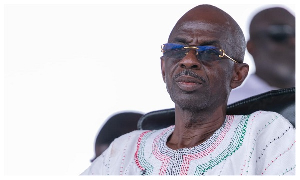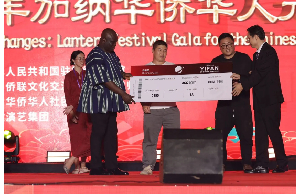In May 2010, I put out an article on the burgeoning real estate market in Ghana with the title “The luxury condo and townhome market is booming in Ghana.” (http://www.ghanaweb.com/GhanaHomePage/features/The-Luxury-Condo-And-Town-Home-Market-Is-Booming-In-Ghana-182321)
Again, in March 2013, being a student of real estate, I put out another article with the title “The insatiable scramble for luxury real estate in Ghana” (http://www.modernghana.com/news/450206/1/the-insatiable-scramble-for-luxury-real-estate-in-.html).
In March 2014, my instincts on the real estate scene in Ghana got me to put out this article “Ghana as an attractive real estate investment destination” (http://www.ghanaweb.com/GhanaHomePage/features/Ghana-as-an-Attractive-Real-Estate-Investment-Destination-302146).
Today, in the year 2015, I am going to be very bold and predict to my fellow industry practitioners that THE HIGH LUXURY REAL ESTATE PRICES IN GHANA WILL COME DOWN!
In our industry, this is nothing new. It has happened before in other countries --– in Japan, in Europe and most recently in the US. Indeed, when it happened in the US, it created and economic meltdown not only for that country but also for the rest of the world. The results were catastrophic. When America sneezes, the rest of the world catches a cold, indeed!
Why do I predict that the high luxury real estate prices we have been experiencing will come down in Ghana? Because the luxury real estate market in Ghana has been so flooded and saturated by so many industry players that, suddenly, we now have a glut and an oversupply of properties in that segment of the market; so much so that it is not funny and the laws of simple economics will have to apply: Supply has outstripped demand and prices will have to come down to excite demand.
There is absolutely nothing they can do - those real estate developers who already have so many projects in the pipeline, whose construction loans have already been approved and projects already started. They must simply go through the process and possibly get a haircut on their profit margins when their projects are completed and ready for the marketplace.
In the year 2010, there were very few apartments in Accra. Indeed, you could easily count them on your fingers if you drove through the city. The following year, 2011, was the year when Ghana was being touted by the World Bank and the International Monetary Fund (IMF) as the fastest growing emerging market economy in the world! (Ghana 20.146 %, Qatar 14.337 %, Turkmenistan 12.178 %, China 9.908 %).
Great news for the investor community in the world indeed, and they descended on our country in droves! The Ghana Investment Promotion Center (GIPC) was busy welcoming these new investors into our country, directing them to what to do to get settled.
From their hotels rooms, these investors definitely needed permanent accommodation in our country to settle down to begin their projects. Demand for luxury real estate was at its peak and the developer community responded in tandem. More and more apartment projects sprang up in Cantonments, Ridge, Osu, Dzorwulu and the Airport Residential Area. The new enclave called Airport City became a construction site for brand new offices and luxury hotels.
In those days, hotels in these areas were reporting 100% occupancies and rental prices for apartments in these areas were sky-high. It was easy to rent an unfurnished 3-bedroom luxury apartment in these areas for anything between $3000 to $4000, and you could easily buy these same units for $400,000 to $500,000. Four-bedrooms would easily cost you $500,000 to $600,000 and penthouses were selling for anything between $700,000 to $800,000. Those were the heydays for developers whose projects had already been completed and were ready for prime time. They sold off quickly and made very good money!
Today, in year 2015, it is a completely different marketplace. Recently completed apartment projects are empty, literally begging for buyers or renters to pick up! Because I am on the ground floor in our industry and I happen to be in direct contact with both buyers and renters on one hand and sellers and developers on the other hand, I am going to use my most recent experience on the ground to buttress the point I am making in this essay.
The example I am going to use shall remain nameless even though it is real. I recently got engaged by an investor who had purchased these beautiful 20+ units of apartments in a gated community two years ago in a highly desirable part of town. Except for two tenants, the property remained empty for the entire period until five months ago when I took up his appointment. At that time, the rent this property owner was asking for his 3-bedroom apartments was $2500 per month. I told him, “Sir, you have to reduce the price”.
Reluctantly, he agreed. So from $2500, we went down to $2000, then to $1800 a few weeks after and finally down to $1600. Guess what? Today, we are filling up those apartments very fast and even the tenants are bringing their friends to come by and snap up the remaining. I have promised the owner the property would be completely filled up before I take a vacation this November! Lesson learned.
Why would you want to keep your 20+ units of apartments empty just because you want a certain price for your property that buyers or renters are not willing to pay? The lesson from this simple example is this: it is better to charge a lower rent/price for your property and get it all rented/sold very quickly because it is the marketplace that determines the price and not you! The marketplace, period!
Having said all that, and looking at the real estate market in Ghana today, what developers are really missing in today’s marketplace is their penchant for building exclusively for the luxury segment of the market and completely ignoring the lower segment where demand is highest, and for which the so-called “Affordable Housing” is needed.
That segment of the marketplace for which the government of Ghana is desperately looking for public-private-partnerships (PPP) to fill up the huge 1.7 million units of housing shortage in our country. Why not partner with government to develop housing for the so-called “Chamber-and-hall-self-contained” segment of the marketplace instead of concentrating exclusively on the luxury real estate market? Why not?
Peter Atsu Tsikata
Millennium Properties Ltd (A real estate brokerage and property management company)
Direct: +233-26-655-7066; Email: ptsikata@gmail.com
Opinions of Monday, 19 October 2015
Columnist: Tsikata, Peter Atsu
The high luxury real estate prices in Ghana will come down!
Entertainment














